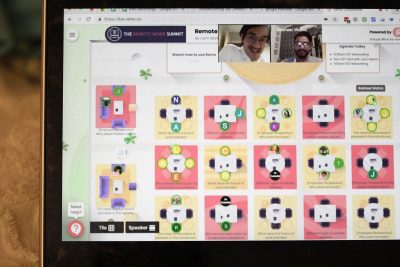
Boston University’s SPLASH — the biannual student activities fair — will host its second virtual iteration on Zoom Saturday.
The change in platform from the Fall could prevent issues such as seat-holding, trolling and hostility some clubs experienced as a result of the virtual format.
Senior Associate Director of Student Activities Bryan Adams said students were able to participate in SPLASH last Fall through a platform called Remo, a software in which users can connect with others via live video communication, similar to Zoom.
“It’s supposed to replicate having a table at an actual sort of involvement fair,” Adams said, “while giving students the ability to search for groups that are actually participating.”
Although last semester was the University’s first-ever virtual SPLASH, Adams said the event was mostly well-received.
“We talked to a few students who said they were having difficulty sitting down at specific tables,” Adams said. “But for the most part, the feedback we had was positive.”
For the Spring, however, Adams said the event will use Zoom instead of Remo. He said the decision was not motivated by any particular reason.
One advantage of using Zoom for clubs will be the ability to control the number of participants in their rooms, he added.
“It’s really whatever the Zoom limit is, so if you’re using a BU account, it’s very very very very many people,” Adams said. “So I can’t imagine that any groups will have an issue with having folks locked out.”
Benjamin Coderre, a freshman in the College of Arts and Sciences, said much of his experience at Fall 2020’s SPLASH consisted of waiting around for a spot to open up at a table.
“I would kind of be loitering, waiting for someone to leave the table, get bored, go to a different floor, try and find a different club to look at,” Coderre said. “And then I’d come back, and it’d be totally different people at the table, because they’d gotten into it while I left.”
Coderre said he only spoke with about four or five clubs total because of capacity limits.
CAS senior Anthony Buono, president of BU’s Young Democratic Socialists of America, said the problems his organization experienced last semester were due to technical issues.
“If you had three club representatives, that means only three people could come and visit your table at a time, which caused a couple of problems,” Buono said. “There was an influx of people who are interested who then had to wait a long time, and there wasn’t really a queue system.”
Buono said these limits prevented YDSA from allowing many of its own members to represent them at SPLASH.
“It kind of discouraged us to have a lot of members be there and show our diversity,” he said, “because we only had so much space.”
On top of these frustrations, Buono said clubs had no clear “kicking privileges” that would prevent students from spending too much time at their virtual table and taking seats from other prospective members.
“We had some people who would just sit at the table, who were obviously hostile to what our club was trying to do, to cause problems and then not leave,” Buono said. “So, no one who was interested could come and take that seat. That was a big problem.”
He said YDSA has been in contact with the Student Activities Office, which assured him SPLASH 2.0 will be “totally different.” Every organization will have their own Zoom room, which also comes with kicking privileges this time around.
“I definitely think it’s a better system than what it was prior,” Buono said, “and I think it’s gonna alleviate a lot of the problems.”
Coderre said using Zoom to host this semester’s SPLASH has its potential advantages and disadvantages.
“It could be kind of chaotic. I don’t know how well it would work … but it’ll probably be easier to find things.” Coderre said. “I don’t know what the right number is but the number of people at each table was, I thought, incredibly low.”
CAS junior CeCe Szkutak, president of BU College Democrats, said she also has “mixed thoughts” about hosting SPLASH over Zoom.
A potential advantage, Szkutak said, will be the ability to enter breakout rooms with students to talk more in-depth with club representatives. However, she said having to search for each club’s Zoom link on ENGAGE — an online club-management tool BU uses — might make Spring 2021’s SPLASH more complicated for students.
“What we liked about Remo is that, similar to SPLASH, every table is all in one place,” Szkutak said, “so people don’t have to look up their name, or anything like that, they just have to look for the specific category of club.”
Szkutak said she wonders if these changes will deter students from engaging with as many clubs as usual.
“I am slightly worried that we won’t have as many people coming to the Zoom, just because you do have to look it up through ENGAGE, and SAO was pretty particular about making sure that link is only on ENGAGE,” Szkutak said. “I’m interested to see if that has any effect on turnout.”
While the event was “fast paced” and a bit of an adjustment, last semester’s virtual SPLASH was a positive experience for BU’s College Democrats, Szkutak said, even with the new format.
“We were a little bit anxious to see how it was going to go,” she said. “But I think, overall, it went fairly well for us.”
Despite the technical constraints that YDSA faced, Buono said Fall 2020’s SPLASH was still successful in terms of generating significant student interest — nearly 70 people attended their first club meeting, and their sign-ups and overall membership tripled.
“It was the most successful SPLASH-to-first-meeting turnaround the club ever had,” Buono said.























































































































